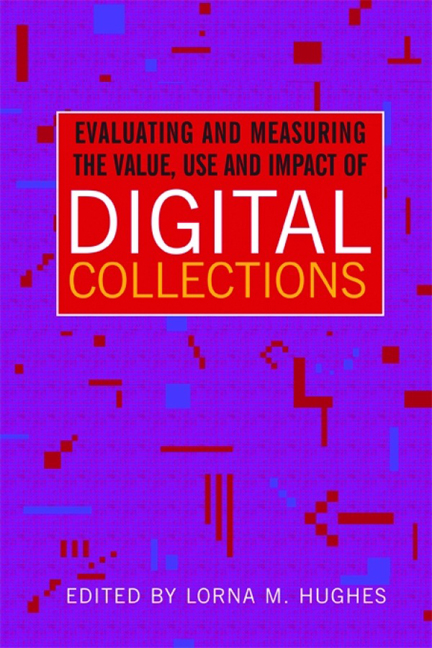Book contents
- Frontmatter
- Contents
- Figures and tables
- Foreword
- Acknowledgements
- The contributors
- 1 Introduction: the value, use and impact of digital collections
- Part 1 Digital transformations in libraries, museums and archives
- Part 2 Understanding and measuring the use, impact and value of digital collections
- Part 3 Enhancing the future impact and value of digital collections
- 9 Using ICT methods and tools in arts and humanities research
- 10 Creating a research data infrastructure: policy and practicalities
- 11 Improving sustainability of publicly funded digital resources
- References and further reading
- Index
- Miscellaneous Endmatter
- Miscellaneous Endmatter
10 - Creating a research data infrastructure: policy and practicalities
from Part 3 - Enhancing the future impact and value of digital collections
Published online by Cambridge University Press: 08 June 2018
- Frontmatter
- Contents
- Figures and tables
- Foreword
- Acknowledgements
- The contributors
- 1 Introduction: the value, use and impact of digital collections
- Part 1 Digital transformations in libraries, museums and archives
- Part 2 Understanding and measuring the use, impact and value of digital collections
- Part 3 Enhancing the future impact and value of digital collections
- 9 Using ICT methods and tools in arts and humanities research
- 10 Creating a research data infrastructure: policy and practicalities
- 11 Improving sustainability of publicly funded digital resources
- References and further reading
- Index
- Miscellaneous Endmatter
- Miscellaneous Endmatter
Summary
Introduction
The recent development of modern and faster computerized infrastructures has enabled researchers to routinely generate research data at an unprecedented level, both quantitatively regarding the amount of data generated from instruments, for example, such as genomic and sensor network data, and qualitatively, producing types of data previously unavailable, such as digital census and health care data. Similarly, an increasing amount of non-born digital research products and source materials are being digitized, such as cultural collections, to facilitate research, management, collaboration and access.
These developments have contributed to a ‘data deluge’ (Hey and Trefethen, 2004; e- Science Directors’ Forum Strategy Working Group, 2009) that gives researchers access to a rich and massive amount of data across disciplinary boundaries. At the same time, the provision of high-capacity networks and improvements in research data capture methods have provided researchers with a means to take data sets produced in one geographical location and aggregate them with data produced elsewhere. Some have described this as the evolution of a new kind of science – ‘data-intensive science’ or fourth paradigm (Hey, Tansley and Tolle, 2009) – that is characterized by three principal activities: data capture, curation and analysis.
For comparison, the first paradigm was characterized by observational science that has existed from the time of early civilizations, followed by a second paradigm – an empirically based approach, first exemplified by Roger Bacon's descriptions in the 13th century. The third paradigm, which evolved in the latter half of the 20th century, is characterized by increasingly complex research challenges based principally on large-scale computational simulation. This has led to the concept of holistic systems; the evolution from wet labs (hands-on scientific research and experimentation) to virtual labs; and an emphasis on modelling, simulation, projection and prediction. The fourth paradigm (Hey, Tansley and Tolle, 2009) is largely focused on the evolution of large databases and digital data archives, and research methods focused on data analysis and mining and patterns discovery, among others.
The age of the fourth paradigm is further aligned with the movement towards ‘open science’, opening up scientific results to the public through the internet, as well as the increased participation of the public (‘citizen science’ (Bonney et al., 2009; Lyon, 2009; Hand, 2010)) as a contributing part to the scientific process, e.g. the global initiative Galaxy Zoo (www.galaxyzoo.org).
Information
- Type
- Chapter
- Information
- Publisher: FacetPrint publication year: 2011
